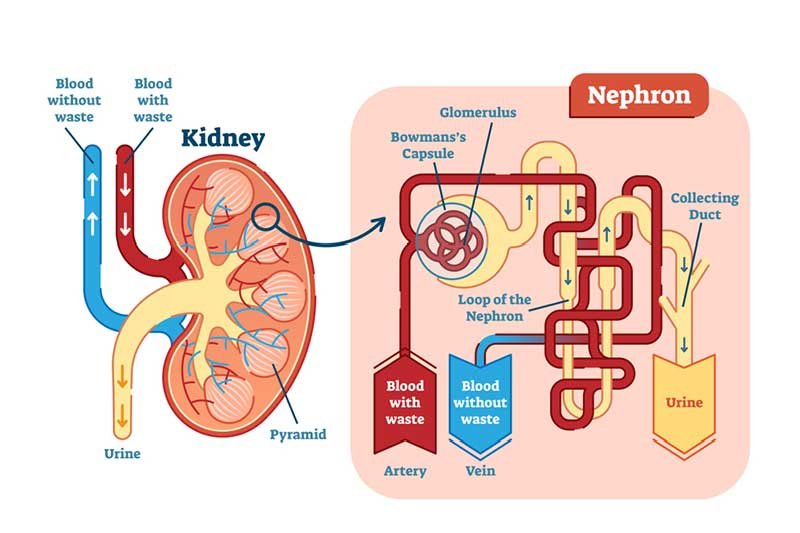The Role of Hydration in Maintaining Optimal Kidney Function
Maintaining optimal kidney function is crucial for overall health and well-being. The kidneys play a pivotal role in filtering waste products and excess fluids from the bloodstream, regulating electrolyte balance, and producing hormones essential for red blood cell production and blood pressure regulation. One often-overlooked factor in supporting kidney health is hydration. Adequate hydration is fundamental for the kidneys to perform their functions efficiently. This article explores the significance of hydration in preserving optimal kidney function and how it relates to the use of Ketosteril tablets in managing kidney health.
Furthermore, the integration of hydration strategies alongside the use of Ketosteril tablets can synergistically contribute to better kidney health outcomes. Ketosteril tablets, by reducing the burden of uremic toxins, alleviate some of the stress on the kidneys. However, their effectiveness can be maximized when combined with adequate hydration practices.
Importance of Hydration for Kidney Function
Hydration is essential for maintaining proper blood flow to the kidneys, ensuring that they can effectively filter waste products and toxins from the blood. When the body is dehydrated, blood volume decreases, leading to decreased blood flow to the kidneys. This diminishes their ability to filter waste products, resulting in the accumulation of toxins in the bloodstream. Chronic dehydration can strain the kidneys over time, potentially leading to kidney damage and dysfunction.
Furthermore, adequate hydration helps prevent the formation of kidney stones by diluting urine and reducing the concentration of minerals and salts that can crystallize and form stones. Dehydration increases the risk of kidney stone formation as urine becomes more concentrated, making it easier for minerals to precipitate and form stones.
Hydration also plays a vital role in maintaining electrolyte balance, which is essential for proper kidney function. Electrolytes such as sodium, potassium, and chloride are crucial for regulating fluid balance and nerve function. Dehydration can disrupt electrolyte balance, leading to complications such as electrolyte imbalances and dehydration-related kidney injury.
Hydration not only facilitates the elimination of waste products but also supports the overall function of the kidneys. It helps in maintaining blood pressure within a healthy range, which is crucial for preserving kidney function. Dehydration can lead to hypotension (low blood pressure), reducing blood flow to the kidneys and impairing their ability to filter waste effectively. By staying well-hydrated, individuals can help prevent such complications and support optimal kidney function.
The Role of Ketosteril Tablets in Kidney Health
Ketosteril tablets are a specific dietary supplement commonly prescribed for individuals with chronic kidney disease (CKD). These tablets contain essential amino acids, including keto acids, which help reduce the accumulation of toxic metabolic by-products in the blood, such as urea and creatinine, by providing an alternative pathway for their elimination.
In individuals with CKD, impaired kidney function leads to a buildup of uremic toxins in the bloodstream, contributing to the progression of kidney damage and complications such as cardiovascular disease. The ketosteril tablets work by reducing the dietary intake of protein, thereby decreasing the production of uremic toxins while still providing essential amino acids necessary for maintaining muscle mass and overall health.
However, it’s important to note that the effectiveness of ketosteril tablets in managing CKD depends not only on their usage but also on various other factors such as hydration status, diet, medication adherence, and overall kidney function. Hydration plays a critical role in optimizing the efficacy of Ketosteril tablets by ensuring adequate blood flow to the kidneys for toxin filtration and maintaining proper fluid balance to prevent dehydration-related complications.
Moreover, hydration aids in the prevention of urinary tract infections (UTIs), a common concern for individuals with compromised kidney function. Diluted urine resulting from adequate hydration helps flush out bacteria and prevents their proliferation in the urinary tract. This is particularly beneficial for individuals with CKD, who may be more susceptible to UTIs due to weakened immune function and impaired urinary tract integrity.
Incorporating Hydration into Kidney Health Management
To maintain optimal kidney function and enhance the effectiveness of interventions such as Ketosteril tablets, individuals should prioritize adequate hydration as part of their daily routine. This can be achieved by
- Drinking plenty of fluids throughout the day, aiming for at least eight glasses of water daily or as recommended by a healthcare professional.
- Monitoring urine output and ensuring urine is light yellow in color, indicating adequate hydration.
- Limiting intake of dehydrating beverages such as caffeinated and alcoholic drinks, which can increase urine output and contribute to dehydration.
- Consuming hydrating foods with high water content, such as fruits and vegetables.
- Being mindful of fluid intake during hot weather or physical activity to prevent dehydration.
Incorporating Ketosteril tablets into the treatment regimen of individuals with CKD requires careful consideration of various factors, including hydration status. Healthcare professionals play a crucial role in educating patients about the importance of hydration and monitoring their fluid intake to ensure optimal outcomes. Patient education regarding the proper use of Ketosteril tablets and the significance of hydration can empower individuals to take an active role in managing their kidney health.
In addition to hydration and medication management, lifestyle modifications such as maintaining a balanced diet and regular exercise are essential for supporting kidney health. A diet rich in fruits, vegetables, whole grains, and lean proteins can provide essential nutrients while minimizing the intake of potentially harmful substances. Physical activity helps improve blood circulation and cardiovascular health, which indirectly benefits kidney function.
Conclusion
In conclusion, maintaining optimal kidney function is essential for overall health, and hydration plays a pivotal role in supporting kidney health. Adequate hydration ensures proper blood flow to the kidneys, helps prevent the formation of kidney stones, and maintains electrolyte balance. When managing conditions such as CKD, hydration is particularly important in optimizing the efficacy of interventions such as Ketosteril tablets. By incorporating hydration into daily kidney health management practices, individuals can promote optimal kidney function and overall well-being.







